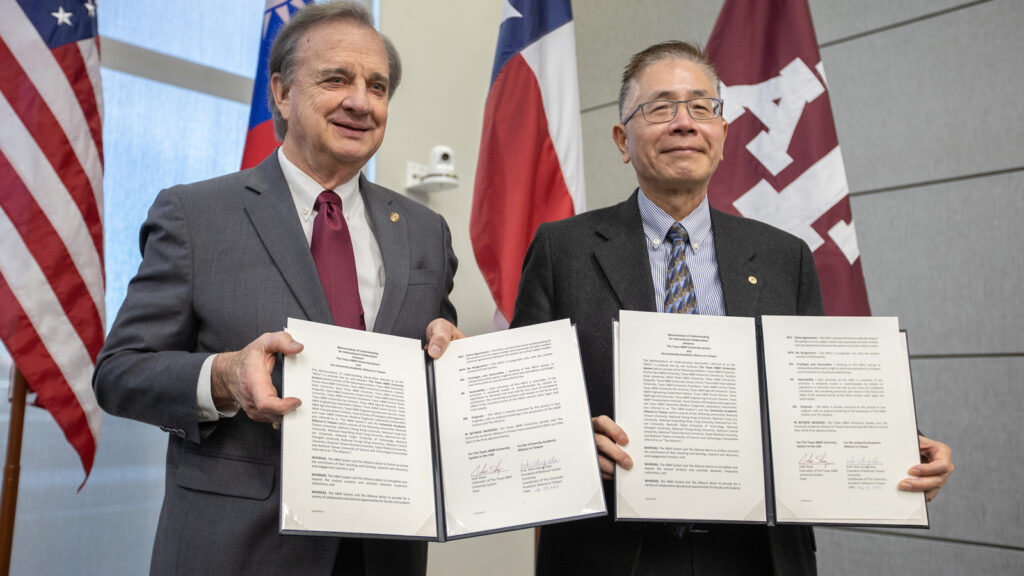The Texas A&M University System and the University Academic Alliance in Taiwan Sign Collaborative Agreement
•
min. read

BRYAN-COLLEGE STATION, Texas — Top officials with The Texas A&M University System and University Academic Alliance in Taiwan signed a student exchange and research agreement Monday.
The memorandum of understanding – which was signed by Texas A&M System Chancellor John Sharp and President Wen-Chang Chen Coordinator of The University Academic Alliance in Taiwan – is designed to leverage the U.S.’s strength as an innovator in semiconductor design with Taiwan’s expertise as a leader in semiconductor manufacturing.
Additionally, the agreement allows for the collaboration on quantum technology, agriculture, the health sciences, engineering, space technology and the Mandarin language.
“I am eager to see how we will progress as we work closely together with our friends in Taiwan,” John Sharp, chancellor of the Texas A&M System, said. “This is this kind of collaboration that leads to the most exciting advancements.”
The collaborative agreement allows for participation from all 11 universities of the Texas A&M System and the 12 universities of the University Academic Alliance in Taiwan.
“This is exciting and significant,” Political Deputy Minister of Education Dr. Mon-Chi Lio said. “This MOU will provide a strong foundation for strengthening academic exchanges, and cooperation between Taiwan and Texas.”
Wen-Chang Chen, president of NTU the convener of the Universities Academic Alliance in Taiwan, added: “I really look forward to exciting synergy between the two systems based on their core competencies and mutual interest. Indeed, recently TAMU and UAAT have formed teams to work closely on the 2023-2026 Taiwan-U.S. Advanced Chip Engineering Design and Fabrication Research Program jointly supported by the National Science Council of Taiwan and the U.S. National Science Foundation.”
As part of the arrangement, a field trip is being planned for students from the Texas A&M System to visit manufacturing sites in Taiwan. There also will be opportunities for a research exchange that would involve graduate students from both countries.
The MOU signed Monday covers a period of five years, and it can be renewed beyond five years by mutual written agreement.
Taiwan and the U.S. had engaged into an agreement in March called “The Education Initiative Three-Year Strategic Plan.” The plan is intended to foster a two-way talent development exchange within the semiconductor industry.
Also, the Texas A&M System hosted the Texas Semiconductor Summit last month. It was attended by technology experts, industry leaders, university officials and government representatives. More information is available at https://today.tamu.edu/2023/10/09/texas-semiconductor-summit/.
Attendees from The Texas A&M University System included:
- John Sharp
- Joe Elabd, Vice Chancellor of Research
- David Staack, Associate Vice Chancellor of Research
- Alan Sams, Provost and Vice President for Academic Affairs (Texas A&M University)
Attendees from The University Academic Alliance in Taiwan included:
- Jing-Yang Jou, President, National Central University
- Wan-jiun Liao, Executive Vice President, National Taiwan University
- Chi-Chung Chou, Senior Vice President, Vice President for International Affairs, National Chung Hsing University
- Kwun-Min Chen, Executive Vice President, National Taiwan Normal University
- Chung-Chih Wu, Vice President for Research and Development, National Taiwan University
- Ya-Ping Chiu, Deputy Vice President for Research and Development, National Taiwan University
- Shiao-Wei Kuo, Dean, College of Engineering, National Sun Yat-sen University
- Li-Chun Wang, Dean and Chair Professor, College of Electrical and Computer Engineering, National Yang Ming Chiao Tung University
- Men-Shen Tsai, Associate Dean, College of Mechanical and Electrical Engineering, National Taipei University of Technology
- Yu-Chih Huang, Director of the Globalization and Development Office, College of Electrical and Computer Engineering, National Yang Ming Chiao Tung University
- Chee-Wei Chang, Department Chair, Department of Space Science and Engineering, National Central University
Attendees from The Taipei Economic and Cultural Office in Houston included:
- Andrea Yang, Director, Education Division
- Elissa Chung, Project Manager, Education Division
Attendees from the Ministry of Education (attending virtually):
- Mon-Chi Lio, Political Deputy Minister
- Yen-Yi Lee, Director General, Department of International & Cross-Strait Education
- Liao, Kao-Hsien, Deputy Director General, Department of International & Cross-Strait Education
- Tseng, Hsin-Yuan, Senior Specialist, Department of Higher Education
Attendee from the Taipei Economic and Cultural Office in Houston (attending virtually):
- Director General Yvonne Hsiao
Attendee from the American Institute in Taiwan (AIT) in Taipei (attending virtually):
- Public Affairs Officer Arend Zwartjes
Attendees from The University Academic Alliance in Taiwan (attending virtually):
- Wen-Chang Chen, President, National Taiwan University
- Tsai-Yen Li, President, National Chengchi University
- Cheng-Chih Wu, President, National Taiwan Normal University
- Chih-Wen Kuo, Vice President, National Sun Yat-sen University
- Shu-Heng Chen, Vice President, National Chengchi University
- Jhy-Chern Liu, Vice President, National Taiwan University of Science and Technology
- Luisa Shu-Ying Chang, Executive Vice President, Taipei Medical University
- Mitch Ming-Chi Chou, Vice President for International Affairs, National Sun Yat-sen University
- Chua-Chin Wang, Vice President for Research and Development, National Sun Yat-sen University
- Jenn-Ming Song, Dean of the office of R&D, National Chung Hsing University
- Ta-Jen Yen, Vice President for Global Affairs, National Tsing Hua University
- Wensyang Hsu, Vice President for International Affairs, National Yang Ming Chiao Tung University
- Ching-Ping Tang, Vice President for International Cooperation, National Chengchi University
- Cindy Su, CEO, Office of International Affairs, National Cheng Kung University
